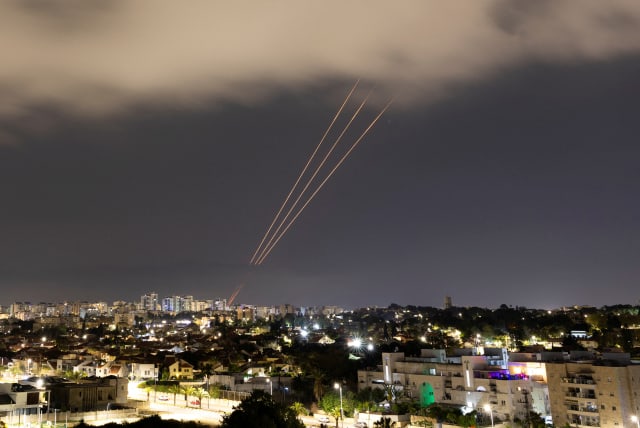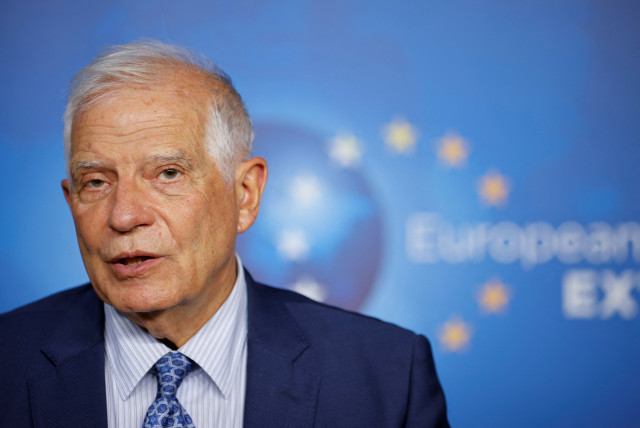US, EU urge Israel not to spark regional war in Iran response

The US and the EU spoke out as the IDF has made a decision on how to respond but has not yet set the timing for when to take action.
The United States and the European Union urged Israel to spark a regional war when it responded to Iran’s missile and drone attack against the Jewish state over the weekend.
US President Joe Biden “doesn’t want to see a war with Iran. He doesn't want to see the conflict widen or deepen, National Security Communications Adviser John Kirby told reporters in a gaggle aboard Air Force One on Tuesday.
European Union foreign policy chief Josep Borrell called on Israel to constrain its response and refrain from taking escalatory steps.
“We are standing by Israel and supporting Israel against the Iranian attacks,” Borrell said on Tuesday.
He cautioned, however, that “every time another step is taken on that ladder, the intensity of the military response increases, and we will end up with a fully blown war which nobody wants.” Borrell spoke with reporters in Brussels as he reported on the results of an informal virtual meeting he held with the bloc’s 27 foreign ministers on Tuesday.
“We have to mobilize all of our diplomatic means to avoid any move” that would lead “us into a regional war. That is what we're trying to avoid,” he stated.
The US and the EU spoke out as the IDF has made a decision on how to respond but has not yet set the timing for when to take action.
A war cabinet meeting that was scheduled for Tuesday, was delayed until Wednesday.
German Foreign Minister Annalena Baerbock flew to Israel on Tuesday. British Foreign Minister David Cameron was expected to arrive on Wednesday to discuss the need for a moderate Iranian response with Israeli officials.
British Prime Minister Rishi Sunak issued a similar message when he spoke by phone Tuesday with his Israeli counterpart Benjamin Netanyahu
"(Sunak) stressed that significant escalation was in no one's interest and would only deepen insecurity in the Middle East. This was a moment for calm heads to prevail," Sunak's office said in a readout of the call.
Israel weathered the attack due to the combined efforts of a newly forged regional military coalition that involved the IDF as well as the British, French, Jordanian, and American armies. The leaders of those countries feel that they have a particular stake in a decision that Israel takes.
US Secretary of State Antony Blinken held an intense series of diplomatic conversations to avoid escalation, State Department spokesperson Matthew Miller told reporters in Washington.
Blinken spoke with the Prime Minister and Foreign Minister of Qatar on Tuesday and continued talks with members of the war cabinet, Miller said.
Blinken is delivering the same message in every conversation that the US does not want to see further escalation of the conflict.
Israel has not informed the State Department of any plans to respond to Iran, Miller said.
"We have been clear that we are committed to Israel's defense, but we do want to see - as you've heard multiple members of the administration say - an escalation of this conflict," Miller stressed
The State Department is working to ensure a "coordinated diplomatic response" to the escalatory actions taken by Iran, Miller said, as evidenced by Blinken and Biden's conversations with G7 counterparts.
The G7 is expected to meet on Wednesday with US President Joe Biden participating.
In Brussels Borrel said, the EU’s foreign ministers and defense ministers will convene this coming Monday and will also meet with the members of the Gulf Cooperation Council.
The EU is looking to expand its restrictive measures against Iran as it relates to drones and missiles. It also plans to issue sanctions against those who help supply Iranian arms to proxy groups in the Middle East.
Borrell stressed the danger facing the region, as he explains that the weekend attack “represents a major escalation of an already very tense situation in the region.”
He echoed the words of UN Secretary-General Antonio Guterres when he stated that the region “was on the edge of an abyss.”
It was as if the region was engaged in a chess game that would end in a “full war.”
“If there is a regional escalation and the whole region is in war, then the war in Gaza will not stop, and the sufferings of the people in Gaza will increase,” he stated.
EU foreign ministers took a strong stand, asking “all actors in the region to move away from the abyss in order not to fall into it,” Borrell stated, as he stressed that the 27-member bloc supported Israel in its battle against Iran.
Turkish President Tayyip Erdoğan, however, blamed Netanyahu for the escalation with Iran, as he referred to the IDF strike on a building in the Iranian embassy compound that killed seven officers.
"Israel is trying to provoke a regional conflict, and its attack on Iran's embassy in Damascus was the last drop," he told a press conference in Ankara after a cabinet meeting.
He added that new regional conflicts were possible as long as the "cruelty and genocide" in Gaza continued and called on all parties to act with common sense. He also slammed the West for condemning Iran's attack but not Israel's strike on Iran's embassy.
Vladimir Putin's comments on the rising Middle East tensions
Russian President Vladimir Putin on Tuesday urged all sides in the Middle East to refrain from action that would trigger a new confrontation which he warned would be fraught with catastrophic consequences for the region, the Kremlin said.
Putin, who has forged much closer ties with the Islamic Republic since sending troops into Ukraine in 2022, spoke to Iranian President Ebrahim Raisi by phone about what the Kremlin called "retaliatory measures taken by Iran."
Putin, in his first publicly aired comments on Iran's attack, said the root cause of the current instability in the Middle East was the unresolved conflict between Palestinians and Israel.
"Vladimir Putin expressed hope that all sides would show reasonable restraint and prevent a new round of confrontation fraught with catastrophic consequences for the entire region," the Kremlin said.
"Ebrahim Raisi noted that Iran's actions were forced and limited in nature," the Kremlin said. "At the same time, he stressed Tehran's disinterest in further escalation of tensions."
Tehran gave a slightly different readout of the call, with state media quoting Raisi as declaring that Iran would respond more severely, extensively, and painfully than ever to any action against Iran's interests.
Iranian state media quoted Putin as characterizing Tehran's response to Israel as the best way to punish the aggressor and a manifestation of the wisdom of Iran's leaders.
"Both sides stated that the root cause of the current events in the Middle East is the unresolved Palestinian-Israeli conflict," the Kremlin said of the call with Raisi.
Reuters contributed to this report.
Jerusalem Post Store
`; document.getElementById("linkPremium").innerHTML = cont; var divWithLink = document.getElementById("premium-link"); if (divWithLink !== null && divWithLink !== 'undefined') { divWithLink.style.border = "solid 1px #cb0f3e"; divWithLink.style.textAlign = "center"; divWithLink.style.marginBottom = "15px"; divWithLink.style.marginTop = "15px"; divWithLink.style.width = "100%"; divWithLink.style.backgroundColor = "#122952"; divWithLink.style.color = "#ffffff"; divWithLink.style.lineHeight = "1.5"; } } (function (v, i) { });

